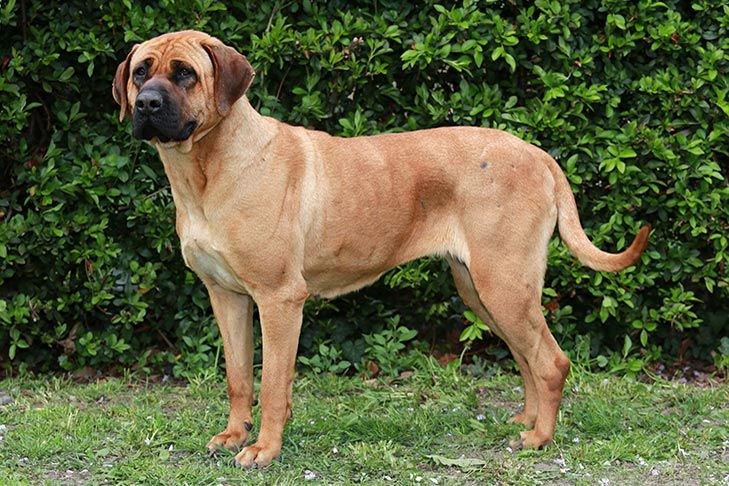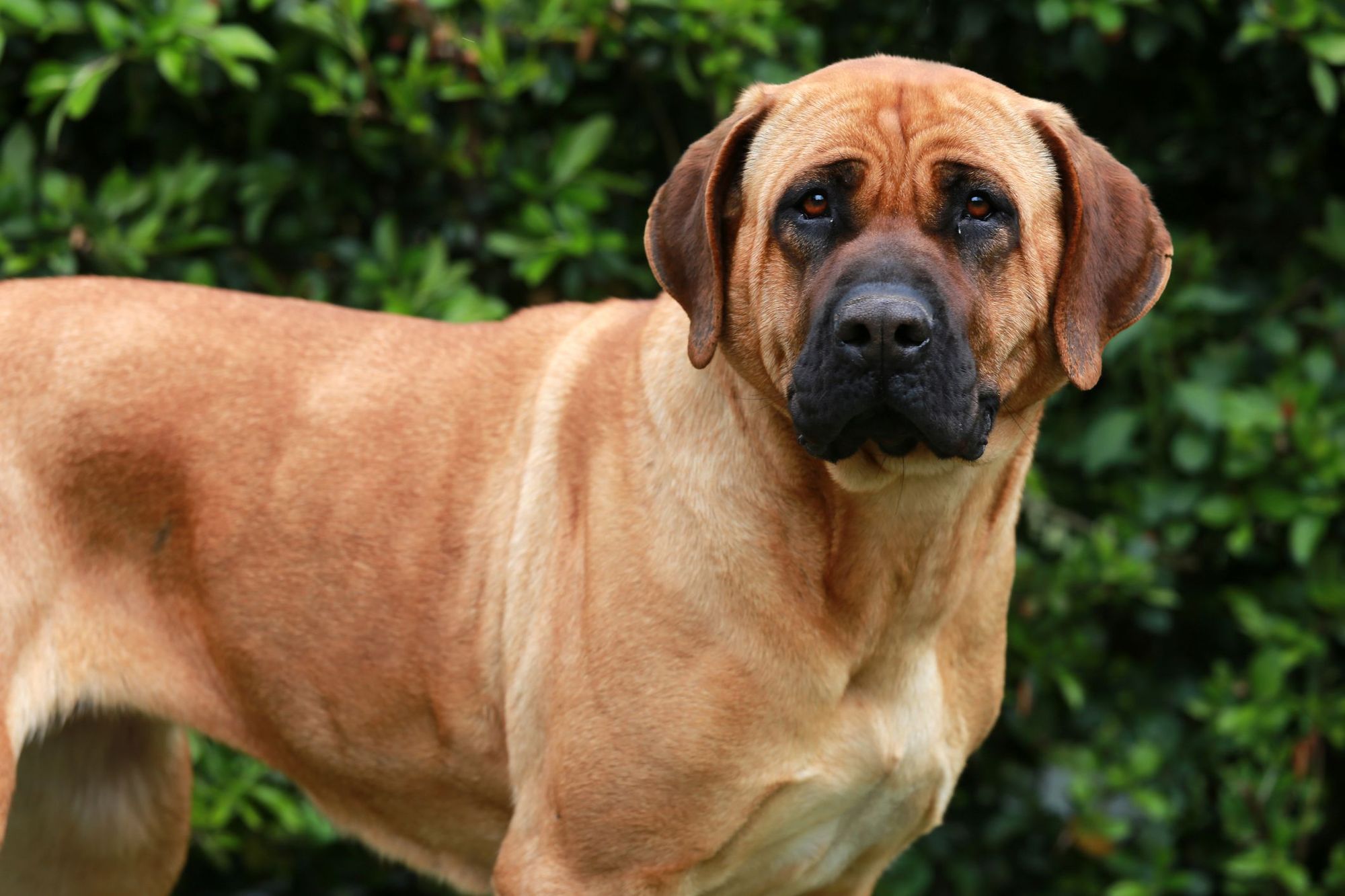If you've ever crossed paths with a Tosa, you likely felt an undeniable aura of strength and poise. Originating from Japan, the Tosa breed has captured the hearts of many with its imposing stature and unwavering loyalty. In this article, we'll delve into the intricacies of Tosa ownership, exploring their role as guard dogs, physical attributes, temperament, health considerations, and much more.

Introduction to the Tosa Breed
The Tosa, also known as the Tosa Inu or Japanese Mastiff, traces its roots to 19th-century Japan. Bred for dog fighting, these remarkable canines are a crossbreed of indigenous Japanese dogs and various Western breeds like the Mastiff, Bulldog, and Great Dane.
Known for their massive build and muscular physique, Tosas exudes an air of strength and confidence. Despite their intimidating appearance, they are known for their calm demeanor and unwavering loyalty to their owners.

Tosa as a Guard Dog
Tosas possess an instinct to guard and protect. This inherent trait, coupled with their intelligence, makes them excellent candidates for guard dog training. Proper training is essential to harness the full potential of a Tosa as a guard dog. Training should focus on obedience, socialization, and specific guard commands.
Tosa's Physical Attributes
In the realm of canine magnificence, the Tosa stands as a paragon of strength and regality. This breed's physical attributes command attention and respect, embodying a harmonious blend of power and elegance.
Size and Build
Tosas are imposing figures, with males typically reaching heights between 22 to 24 inches at the shoulder. Their weight, ranging from 130 to 200 pounds, emphasizes their substantial and well-muscled build. The Tosa's stature exudes authority, marking it as a formidable presence.
Distinctive Features
A closer examination of the Tosa reveals distinctive features that contribute to its awe-inspiring appearance. The broad head, accentuated by small, dark eyes, projects an alert and intelligent expression. The short, thick coat enhances its muscular contours, creating a visual spectacle of strength and grace.
In the world of canine aesthetics, the Tosa's physical attributes stand as a testament to meticulous breeding and a deep respect for the breed's standards.
Temperament and Personality
While the Tosa's physical prowess is undeniable, its temperament and personality add layers of depth to its character. Far from being merely a powerhouse, the Tosa exhibits a demeanor that is both noble and gentle.
Tosa's Demeanor
In daily interactions, the Tosa carries itself with a calm and composed demeanor. This inherent tranquility, coupled with a watchful eye, showcases a dog that is not quick to react but is always aware of its surroundings. This calmness is not to be misconstrued as passivity; rather, it is a testament to Tosa's self-assured nature.
Compatibility with Families
Contrary to its imposing exterior, the Tosa is remarkably compatible with families. When raised in a loving environment, it forms deep bonds with its human companions. Children, when taught to respect its boundaries, find in the Tosa a loyal and protective playmate. This breed's compatibility extends beyond familial bonds to a broad sociability when properly socialized.
The Tosa's temperament, therefore, is a delicate balance of serenity and steadfast loyalty, making it not just a guard dog but a cherished member of the family.
Health Considerations
In the realm of canine well-being, understanding the health considerations of the Tosa breed is paramount. Like all breeds, Tosas are susceptible to certain health issues that necessitate vigilant care and proactive measures.
Common Health Issues
Hip dysplasia, a malformation of the hip joint, is a concern in larger breeds, including the Tosa. Regular veterinary check-ups and early detection through diagnostic imaging are crucial for managing this condition. Additionally, Tosas may be prone to certain heart issues, emphasizing the importance of heart health monitoring.
Maintaining optimal health also involves addressing skin conditions that can arise due to their short coat. Regular grooming, inspection, and appropriate skincare routines are essential to prevent and manage any dermatological concerns.
The key to Tosa's longevity lies in preventive healthcare, a balanced diet, and a vigilant approach to their overall well-being.
Tosa in Popular Culture
The Tosa breed, with its commanding presence and rich history, has made a significant impact on popular culture. From movies to literature, the Tosa has etched its paw prints on the canvas of human creativity.

Appearances in Movies and Literature
Tosas have graced the silver screen and leapt from the pages of literature, captivating audiences with their strength and loyalty. Their imposing yet dignified appearance often places them in roles that echo their real-life qualities as guardians and protectors.
In literature, Tosas are sometimes cast as symbols of loyalty and courage, embodying traits that resonate with readers on a profound level. This cultural representation further amplifies the breed's allure.
Impact on Breed Popularity
The portrayal of Tosas in popular culture has significantly influenced their popularity. Celebrities and media depictions have brought this breed into the limelight, drawing attention to its distinctive qualities.
While this popularity surge has introduced more people to the Tosa breed, it comes with the responsibility of ensuring that potential owners are well-informed about the breed's needs and characteristics. Awareness of their role in popular culture should not overshadow the commitment required for responsible ownership.
In essence, the Tosa's presence in popular culture is a testament to its remarkable qualities, but enthusiasts need to delve beyond the surface and understand the breed's intricacies for the sake of responsible ownership.
Selecting a Tosa Puppy
The process of selecting a Tosa puppy is a critical precursor to a lifelong companionship that demands careful consideration. Here are key aspects to guide you through this crucial decision-making process:
Responsible Breeding Practices
Opt for breeders who adhere to responsible breeding practices. A reputable breeder prioritizes the health and well-being of the Tosa breed. This involves rigorous health screenings for genetic conditions and a commitment to the breed's standards. Investigate the breeder's reputation, ask for references, and ensure that they provide a nurturing environment for the puppies.
What to Look for in a Reputable Breeder
A reputable Tosa breeder is transparent and willingly shares information about the puppy's lineage, health records, and any early training they may have undergone. A visit to the breeder's facility allows you to assess the living conditions and socialization opportunities provided for the puppies. Pay attention to the breeder's dedication to the breed and their willingness to address your concerns.
Training and Socialization
Once you've selected your Tosa puppy, the journey of training and socialization begins. These early stages are pivotal in shaping a well-adjusted and obedient companion:
Importance of Early Training
Early training is fundamental to a Tosa's development. Begin with basic commands, emphasizing positive reinforcement. Tosas are intelligent dogs, and consistent, patient training fosters a strong bond between owner and pet. Establishing clear expectations from the outset lays the foundation for a well-mannered adult dog.
Socializing with Other Pets and People
Tosas, despite their imposing appearance, benefit greatly from early socialization. Expose them to various environments, people, and other animals. This instills confidence and helps prevent potential behavioral issues. Controlled, positive introductions to different stimuli create a well-rounded and sociable adult Tosa.
Exercise Requirements
Adequate exercise is crucial to meeting the physical and mental needs of a Tosa. Failure to provide sufficient activity can lead to boredom and undesirable behaviors. Here's how to address their exercise requirements effectively:
Daily Activity Needs
Tosas thrive on daily exercise. A combination of brisk walks, playtime, and mentally stimulating activities keeps them physically fit and mentally engaged. Interactive play sessions further reinforce the bond between the owner and Tosa.
Suitable Exercise Routines
Tailor exercise routines to suit your Tosa's individual needs. Engaging in activities that challenge their intelligence, such as puzzle toys or obedience training, keeps them mentally sharp. Additionally, consider activities that tap into their natural instincts, like retrieving games or agility exercises.
Legal Restrictions and Responsibilities
In some areas, Tosa ownership may be subject to breed-specific legislation. Prospective owners should be aware of local regulations and responsibilities associated with owning this breed.
Owning a Tosa comes with responsibilities, including proper containment, obedience training, and adherence to local laws. Responsible ownership ensures the safety of the happy dog and the community.

Tosa's Diet and Nutrition
Ensuring the optimal diet and nutrition for your Tosa is foundational to their overall health and well-being. Here's a comprehensive guide to navigating their dietary requirements:
Dietary Requirements
Tosas, with their robust build, require a balanced and nutrient-rich diet. High-quality dog food, formulated to meet the specific needs of large breeds, is essential. Protein, derived from quality sources, supports muscle development, while controlled fat content maintains an appropriate weight. Consult with your veterinarian to determine the right feeding plan based on your Tosa's age, weight, and activity level.
Tips for Feeding and Maintaining Optimal Health
Establish a consistent feeding schedule to regulate their intake and avoid overfeeding. Monitor their weight and adjust portions accordingly. Avoid feeding them human food, especially items toxic to dogs. Regular veterinary check-ups help assess their overall health and ensure their dietary needs are met. Adequate hydration is equally crucial; always provide access to clean, fresh water.
Grooming Practices
Despite their short coat, Tosas necessitate regular grooming to preserve their health and appearance. Proper grooming is more than aesthetics; it is a cornerstone of responsible pet ownership:
Coat Care and Grooming Tips
Regular brushing, at least once a week, helps control shedding and removes loose hair. Pay particular attention to areas prone to matting, such as behind the ears and in the armpits. Periodic baths, typically every month or as needed, maintain their coat's cleanliness and health. Nail trimming, ear cleaning, and dental care should be integral components of their grooming routine.
Bathing and Regular Maintenance
When bathing your Tosa, use a dog-specific shampoo to avoid skin irritation. Thoroughly dry their coat to prevent moisture-related skin issues. Regular maintenance, including checking ears for signs of infection, trimming nails to a safe length, and brushing their teeth to promote oral health, contributes to their overall well-being.
Tosa Rescue and Adoption
For those considering Tosa rescue and adoption, understanding the unique aspects of this process is essential. Here's a comprehensive guide to embarking on the journey of adopting a Tosa:
Considerations for Adopting a Tosa
Adopting a Tosa requires a commitment to understanding their history, temperament, and any potential challenges they may bring. Be prepared to invest time in gaining their trust and addressing any past traumas they may have experienced. Tosa rescues often have specific requirements for potential adopters, ensuring the best possible match for both the dog and the new family.
Rescue Organizations and Resources
Various rescue organizations specialize in Tosa adoption. Research these organizations thoroughly, considering their reputation, adoption process, and post-adoption support. Be prepared for a comprehensive screening process that may involve home visits and interviews. These measures are in place to ensure that Tosa rescues find suitable, loving homes.

Conclusion
In conclusion, the Tosa breed stands as a testament to the harmonious blend of strength, loyalty, and gentleness. Whether as a guardian, a family companion, or a cultural symbol, the Tosa continues to captivate hearts worldwide. Responsible ownership, proper training, and attentive care are paramount to ensuring a fulfilling and happy life for these magnificent dogs.
Frequently Asked Questions (FAQs)
- Are Tosa dogs suitable for apartment living?
- While Tosas can adapt to apartment living with proper exercise, their size and exercise needs are better suited for homes with spacious yards.
- Do Tosa dogs get along with children and other pets?
- Yes, when properly socialized, Tosas can be gentle and affectionate with children and other pets.
- How much exercise does a Tosa require daily?
- Tosas benefit from at least 30 to 60 minutes of exercise daily, including walks, playtime, and mentally stimulating activities.
- What are common health issues in Tosa dogs?
- Common health concerns include hip dysplasia, heart issues, and skin conditions. Regular vet check-ups are crucial.
- Is Tosa ownership restricted by law in certain areas?
- Some areas may have breed-specific legislation regarding Tosa ownership. Prospective owners should check local regulations.




